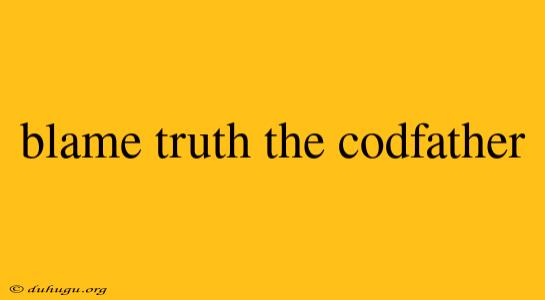Blame Truth: The Codfather
The Notorious Case of the Cod Fish
In the bustling streets of New Bedford, Massachusetts, a tale of deceit, corruption, and cod fish unfolded. Meet Carlos Rafael, aka "The Codfather," a fishing tycoon who built an empire on the principles of dishonesty and manipulation.
The Mastermind Behind the Scam
Rafael, a Portuguese-American fisherman, started his career in the 1980s. Over the years, he expanded his business, accumulating a fleet of fishing vessels and a processing plant. His empire was built on the premise of overfishing and misreporting catches to evade quotas and regulations. Rafael's scheme was ingenious, yet sinister: he would catch more fish than allowed, then falsify records to conceal his true catches.
The Network of Deceit
Rafael's network of co-conspirators included fellow fishermen, fishing vessel captains, and even NOAA (National Oceanic and Atmospheric Administration) officials. They worked together to falsify catch reports, exploiting loopholes in the system and reaping enormous profits. The Codfather's scheme was so elaborate that it took years for authorities to uncover the truth.
The Investigation and Arrest
In 2015, a joint investigation by the NOAA Office of Law Enforcement and the U.S. Coast Guard unraveled Rafael's empire. The investigation revealed that he had misreported over 700,000 pounds of fish, worth millions of dollars. Rafael was arrested and charged with 27 counts of fraud, conspiracy, and tax evasion.
The Fallout
The Codfather's empire crumbled, leaving in its wake a trail of financial devastation and environmental damage. The fisheries affected by his actions suffered significant declines, and the reputation of the entire industry was tarnished. Rafael's case serves as a cautionary tale about the dangers of unchecked greed and the importance of transparency in the fishing industry.
The Legacy of Blame Truth
The Codfather's story is a stark reminder that truth is often the first casualty in the pursuit of profit. His actions damaged not only the environment but also the lives of those who depended on the fishing industry. As we look to rebuild and restore the industry, we must remember the lessons of the Codfather's downfall: honesty, accountability, and transparency are essential in preserving the delicate balance between human activity and the natural world.
